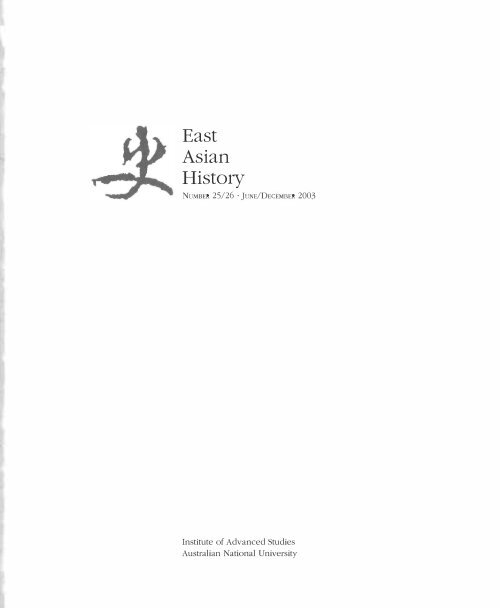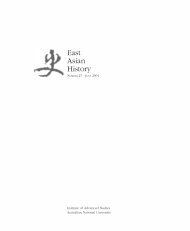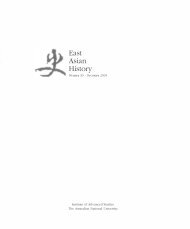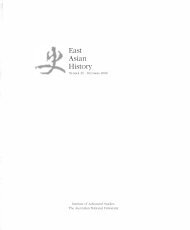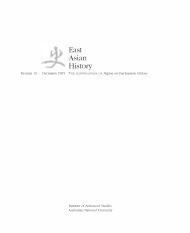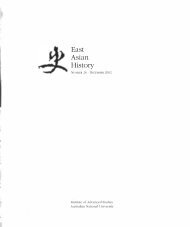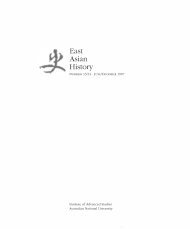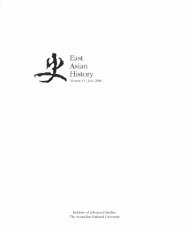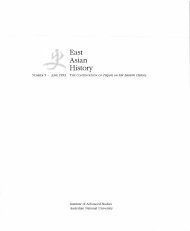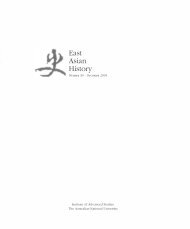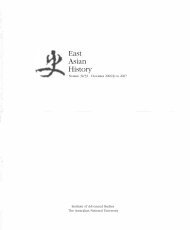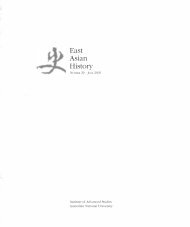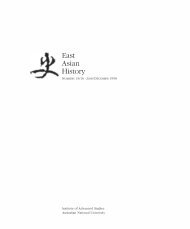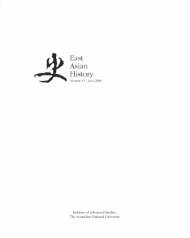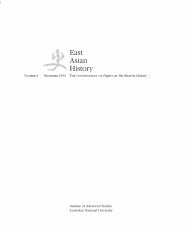Inventing the Romantic Kingdom - East Asian History
Inventing the Romantic Kingdom - East Asian History
Inventing the Romantic Kingdom - East Asian History
You also want an ePaper? Increase the reach of your titles
YUMPU automatically turns print PDFs into web optimized ePapers that Google loves.
<strong>East</strong><br />
<strong>Asian</strong><br />
<strong>History</strong><br />
NUMBER 25/26 . JUNE/DECEMBER 2003<br />
Institute of Advanced Studies<br />
Australian National University
Editor<br />
Associate Editor<br />
Editorial Board<br />
Geremie R. Barme<br />
Helen Lo<br />
Mark Elvin (Convenor)<br />
B0rge Bakken<br />
John Clark<br />
Louise Edwards<br />
Colin Jeffcott<br />
W. J. F. Jenner<br />
Li Tana<br />
Kam Louie<br />
Gavan McCormack<br />
David Marr<br />
Tessa Morris-Suzuki<br />
Kenneth Wells<br />
Design and Production<br />
Business Manager<br />
Printed by<br />
Helen Lo, Oanh Collins, Marion Weeks, Tristan Norman<br />
Marion Weeks<br />
Goanna Print, Fyshwick, ACT<br />
This is <strong>the</strong> combined twenty-fifth and twenty-sixth issue of <strong>East</strong> <strong>Asian</strong> <strong>History</strong>,<br />
printed in December 2004, in <strong>the</strong> series previously entitled Papers on Far <strong>East</strong>ern<br />
<strong>History</strong>. An externally refereed journal, it is published twice a year<br />
Contributions to<br />
Subscription Enquiries to<br />
The Editor, <strong>East</strong> <strong>Asian</strong> <strong>History</strong><br />
Division of Pacific and <strong>Asian</strong> <strong>History</strong><br />
Research School of Pacific and <strong>Asian</strong> Studies<br />
Australian National University<br />
Canberra ACT 0200, Australia<br />
Phone +61 26125 3140 Fax +61 26125 5525<br />
Email marion.weeks@anu.edu.au<br />
Subscriptions, <strong>East</strong> <strong>Asian</strong> <strong>History</strong>, at <strong>the</strong> above address, or to<br />
marion.weeks@anu.edu.au<br />
Annual Subscription Australia A$50 (including GST) Overseas US$45 (GST free) (for two issues)<br />
ISSN 1036-6008
iii<br />
CONTENTS<br />
1 The Origins of Han-Dynasty Consort Kin Power<br />
Brett Hinsch<br />
25 <strong>Inventing</strong> <strong>the</strong> <strong>Romantic</strong> <strong>Kingdom</strong>: <strong>the</strong> Resurrection and Legitimization of <strong>the</strong> Shu Han<br />
<strong>Kingdom</strong> before <strong>the</strong> Romance of <strong>the</strong> Three <strong>Kingdom</strong>s<br />
Simon Shen<br />
43 Illusions of Grandeur: Perceptions of Status and Wealth in Late-Ming Female<br />
Clothing and Ornamentation<br />
Sarah Dauncey<br />
69 The Legal and Social Status of Theatrical Performers in Beijing during <strong>the</strong> Qing<br />
Ye Xiaoqing<br />
85 In <strong>the</strong> Tang Mountains We Have a Big House<br />
Michael Williams<br />
113 The Eve of Park's Military Rule: <strong>the</strong> Intellectual Debate on National Reconstruction, 1960-6 1<br />
Kim Hyung-A<br />
141 Japanese Orphans from China: <strong>History</strong> and Identity in a 'Returning' Migrant Community<br />
LiNarangoa<br />
161 Sun-Facing Courtyards: Urban Communal Culture in Mid-1970s' Shanghai<br />
Nicole Huang<br />
183 Liu Dong and his Defence of Theory and Confucianism as Practice<br />
Gloria Davies<br />
191 The Weberian View and Confucianism<br />
LiuDong<br />
-translated by Gloria Davies
iv<br />
Cover calligraphy Yan Zhenqing ,ID'j1gHn, Tang calligrapher and statesman<br />
Cover illustration A memorial from <strong>the</strong> chief eunuch Bian Dekui - "The<br />
Legal and Social Status of Theatrical Performers in Beijing<br />
During <strong>the</strong> Qing" by Ye Xiaoqing, see p.81.
INVENTING THE ROMANTIC KINGDOM:<br />
THE RESURRECTION AND LEGITIMIZATION<br />
OF THE SHU HAN KINGDOM BEFORE THE<br />
ROMANCE OF THE THREE KINGDOMS<br />
Jt Simon Shen 1Xf@B&!<br />
o so vast, 0 so mighty,<br />
The Great River rolls to sea ,<br />
Flowers do waves thrash ,<br />
Heroes do sands smash,<br />
When all <strong>the</strong> dreams drain,<br />
Same are lose and gain.<br />
-Luo Guanzhong iillfq:r, Romance a/<strong>the</strong> Three <strong>Kingdom</strong>s -= 1<br />
When <strong>the</strong> decline of <strong>the</strong> Roman Empire began after <strong>the</strong> second century, <strong>the</strong><br />
demise of Rome's counterpart in <strong>the</strong> <strong>East</strong>, <strong>the</strong> Han il dynasty of China (206<br />
BC-AD 9; AD 25-220), 2 was already well into its final stage. Troubled for decades<br />
by land annexations, palace rivalries and eunuch politics, <strong>the</strong> central<br />
government of <strong>the</strong> <strong>East</strong>ern Han gradually lost effective control over its territories<br />
after <strong>the</strong> Yellow Turban Rebellion jt rtJ.z. L in AD 184. Despite <strong>the</strong><br />
efforts of Cao Cao l!l!Hf, <strong>the</strong> military ruler of <strong>the</strong> Han, to hold toge<strong>the</strong>r some<br />
semblance of a united realm, dozens of warlords still competed for land and<br />
resources. After <strong>the</strong> Battle of Red Cliff #.z. in AD 208, only three rivals<br />
remained, including Cao of <strong>the</strong> central government, and <strong>the</strong> joint winners<br />
of <strong>the</strong> battle, Liu Bei Uf;i and Sun Quan tMI. When Cao died in AD 220,<br />
his son Cao Pi 1f/f overthrew <strong>the</strong> <strong>East</strong>ern Han dynasty and established <strong>the</strong><br />
Wei ft kingdom.3 With <strong>the</strong> establishment of <strong>the</strong> Shu Han IJil kingdom<br />
1 Luo Guanzhong, Romance of <strong>the</strong> three<br />
kingdoms, trans. C. H. Brewitt Taylor (Tokyo:<br />
C. E. Tuttle, 1959), "Overture: <strong>the</strong> Beginning<br />
Song."<br />
2 The Han dynasty is divided into two periods:<br />
<strong>the</strong> Western Han ggyJ (206 Be-AD 9) and<br />
<strong>the</strong> <strong>East</strong>ern Han j:j!:1J (AD 25-220), with an<br />
interlude of <strong>the</strong> Xin ;\iff dynasty (AD 9-23) in<br />
between.<br />
3 The official name of <strong>the</strong> kingdom was "Wei,"<br />
but in order to distinguish it from o<strong>the</strong>r regimes<br />
named "Wei," sometimes it is conventionally<br />
known as <strong>the</strong> "Cao-Wei 'ilrft kingdom."<br />
25
26<br />
SIMON SHEN<br />
Map!<br />
Location of <strong>the</strong> Shu Han kingdom in <strong>the</strong> Era of <strong>the</strong> Three <strong>Kingdom</strong>s<br />
(roughly AD 2205) (Eo Yang, Zhongguo ren shi gang)<br />
4 Similar to that of Wei, <strong>the</strong> formal name of<br />
<strong>the</strong> regime was "Han." However, in order to<br />
distinguish it from <strong>the</strong> unified Han dynasty,<br />
Liu Bei's regime is known as <strong>the</strong> Shu Han<br />
kingdom, and this is <strong>the</strong> name that will be<br />
used in this article (Shu;] being <strong>the</strong> archaic<br />
name for <strong>the</strong> region it controlled-<strong>the</strong> Sichuan<br />
ggJlI basin)<br />
5 The rulers of <strong>the</strong> three kingdoms in fact all<br />
claimed <strong>the</strong> title of emperor m. However,<br />
because none was qualified to establish a real<br />
"empire" in a divided China, <strong>the</strong>ir regimes are<br />
still conventionally known as "kingdoms" 3:<br />
<br />
6 Despite intermittent attempts to attack <strong>the</strong><br />
Wei border, <strong>the</strong> Wu kingdom was mainly<br />
concerned about <strong>the</strong> development of sou<strong>the</strong>ast<br />
China ra<strong>the</strong>r than focusing on its two rivals. For<br />
example, <strong>the</strong> kingdom sent an expedition to<br />
explore present-day Taiwan in AD 230 without<br />
targeting <strong>the</strong> territories of Wei or Shu Han. Sima<br />
Guang, Zi zhi tangjian [Comprehensive mirror<br />
for aid in governmentl (Taiwan: Commercial<br />
Publishing, 1966), year 230, entry 1.<br />
7 Sima Yan "l,\f!,, <strong>the</strong> founding emperor of<br />
<strong>the</strong> Western Jin dynasty, was <strong>the</strong> grandson I<br />
(AD 221-63)4 by Liu and subsequently <strong>the</strong> Wu <br />
kingdom (AD 222-80) by Sun, <strong>the</strong> well-known<br />
Era ofThree <strong>Kingdom</strong>s -=: 1f-f1 (c. AD 220-65)<br />
began (see Map 1)5<br />
Each of <strong>the</strong> three kingdoms had vivid characteristics:<br />
Wei was situated in <strong>the</strong> north-central<br />
region, <strong>the</strong> heartland of <strong>the</strong> Han predecessors,<br />
with superior military strength; Shu Han, despite<br />
having <strong>the</strong> smallest territory among <strong>the</strong> three,<br />
claimed its ancestry from <strong>the</strong> Han dynasty and<br />
was antagonistic toward Wei; Wu, in contrast,<br />
was more like a purely regional regime that had<br />
evidently little ambition to conquer <strong>the</strong> whole of<br />
China. 6 None of <strong>the</strong> three kingdoms were powerful<br />
enough to conquer one ano<strong>the</strong>r, and <strong>the</strong>y<br />
were ultimately replaced by <strong>the</strong> Western Jin [§<br />
if dynasty (AD 265-316) within decades of <strong>the</strong>ir<br />
foundation.7<br />
Of <strong>the</strong> three kingdoms, Shu Han attracts <strong>the</strong><br />
most attention from historians as well as <strong>the</strong><br />
Chinese populace. Denigrated as bandits (zei )<br />
by <strong>the</strong> dominant Wei regime, S Liu Bei and his<br />
followers are surprisingly known as heroes, or<br />
lesser-gods, to most Chinese people today with<br />
Liu himself portrayed as <strong>the</strong> benevolent leader,<br />
general Guanyu 3J3J as <strong>the</strong> god of war, and chancellor Zhuge Liang <br />
% <strong>the</strong> symbol of <strong>the</strong> intelligent and resourceful minister. The transformation<br />
of <strong>the</strong> Shu Han leaders from bandits to heroes is not an historical accident.<br />
Without exaggeration, <strong>the</strong> long-term myth-making process has lasted almost<br />
two millennia and continues even today, with <strong>the</strong> kingdom assigned four<br />
principal attributes: stability in a chaotic world; legitimate descent from <strong>the</strong><br />
glorious Han dynasty; a regime ruled by charismatic, benevolent, righteous<br />
and intelligent leaders; and finally, an archaic political Utopia by contrast<br />
with which present-day Chinese can reflect <strong>the</strong>ir disapproval of contemporary<br />
regimes.<br />
lof <strong>the</strong> Wei chancellor Sima Yi RJ,\f!,lii. Sima<br />
Yan's fa<strong>the</strong>r, Sima Zhao "l,\f!,fP,j, conquered<br />
<strong>the</strong> Shu Han kingdom in AD 263; he himself<br />
replaced <strong>the</strong> Wei ruler in AD 265 and founded<br />
Jin; <strong>the</strong>n he finally captured <strong>the</strong> Wu kingdom<br />
in AD 280 and briefly reunified China.<br />
8 The Wei kingdom viewed both <strong>the</strong> o<strong>the</strong>r two<br />
kingdoms as usurpers, and described <strong>the</strong>m as<br />
"bandits" in official documents. For instance,<br />
in AD 227 Sun Zi J%, a Wei official, told his<br />
ruler that "<strong>the</strong> Shu Han bandits could only hide<br />
in mountains; <strong>the</strong> Wu bandits could only hide I<br />
lin lakes." Sima Guang, Zi zhi tangjian, year<br />
227, entry 4 (translation by <strong>the</strong> author)<br />
9 Chen wrote <strong>the</strong> book during <strong>the</strong> Western Jin<br />
dynasty, when he served as a court official.<br />
Generally it appears to be an objective source<br />
recording most contemporary historic events.<br />
However, some possible biases owing to Chen's<br />
official position will be mentioned in later sections.<br />
Chen Shou, San guo zhi [<strong>History</strong> of <strong>the</strong><br />
three kingdoms], ed. Chen Naiqian (Beijing:<br />
China Bookstall, 1959)
INVENTING THE ROMANTIC KINGDOM<br />
27<br />
Juxtaposed with historical accounts recorded from primary sources, particularly<br />
Chen Shou's *. biographical history San guo zhi -=-"ii;t (<strong>History</strong><br />
oj <strong>the</strong> Three <strong>Kingdom</strong>s)9 and Sima Guang's '§'] ;* chronicle Zi zhi tongjian<br />
1ilii1 0 (Comprehensive Mirror jor Aid in Government), 11 <strong>the</strong> favourable<br />
attitude of <strong>the</strong> Chinese people toward <strong>the</strong> Shu Han kingdom is paradoxical-<strong>the</strong><br />
truths largely contradicting <strong>the</strong> Utopian image of <strong>the</strong> kingdom. For,<br />
like many of its Sichuanese predecessors and successors, <strong>the</strong> Shu Han kingdom<br />
was merely a short-lived, small, regional regime in <strong>the</strong> remote Chinese<br />
past without a Significant cultural or economic legacy. Like many regimes in<br />
a divided, chaotic world, <strong>the</strong> kingdom was also established by<br />
Machiavellian strategies and developed a warlike posture that<br />
resulted in limited indigenous support.<br />
As revealed by historical evidence, <strong>the</strong> Shu Han image<br />
indeed went through a process of romanticization through<br />
which <strong>the</strong> realities gradually became buried. Of <strong>the</strong> various<br />
primary sources contributing to <strong>the</strong> romanticized images of <strong>the</strong><br />
Shu Han, <strong>the</strong> novel Romance oj <strong>the</strong> Three <strong>Kingdom</strong>s is easily<br />
<strong>the</strong> widest-known and most popular, with interesting variants<br />
such as <strong>the</strong> Republican novel Fan San guo yan yi &-=-<br />
(Reverse oj Romance oj <strong>the</strong> Three <strong>Kingdom</strong>s) representing<br />
<strong>the</strong> extreme version of such romanticization (see Figure 1) 12<br />
The result has been that most Chinese people have favoured<br />
<strong>the</strong> Shu Han kingdom over many much stronger, longer-lived,<br />
and truly national dynasties, such as <strong>the</strong> <strong>East</strong>ern Han or Song<br />
dynasty (AD 96 0-1127).<br />
Owing to an intellectual devotion to studying <strong>the</strong> later stages<br />
of romanticization of <strong>the</strong> Shu Han kingdom, particularly after <strong>the</strong><br />
emergence of Romance oj <strong>the</strong> Three <strong>Kingdom</strong>s, this article only<br />
aims to study <strong>the</strong> mythologization in its earlier stages-i.e. <strong>the</strong><br />
reshaping of <strong>the</strong> artificial resurrection and legitimization of <strong>the</strong><br />
regime before <strong>the</strong> sixth century. Without understanding <strong>the</strong> earlier<br />
processes, <strong>the</strong> easy acceptance of <strong>the</strong> future Romance would be<br />
hard to comprehend. In so doing, I will attempt, in <strong>the</strong> following<br />
sections, to disinter <strong>the</strong> historical truths that contrast with <strong>the</strong> myth.<br />
12<br />
Zhou Dahuang JiID:*:Jl'L, Fan San guo yan<br />
yi [Reverse of Romance of<strong>the</strong> Three <strong>Kingdom</strong>s]<br />
(Taiwan: Chit Yau Publishing, 1996).<br />
Figures 1 (and 2 and 3 overleaf)<br />
<strong>Romantic</strong>ized images of Shu Han leaders in <strong>the</strong>ir<br />
extreme versions in Zhou Dayong, Fan San guo yan<br />
yi [Reverse of Romance of <strong>the</strong> Three <strong>Kingdom</strong>s}<br />
10<br />
Although Sima Guang wrote his book in <strong>the</strong> Song '*' dynasty (AD 960-1127),<br />
he systematically separated <strong>the</strong> historical account and sources from his subjective<br />
comments in <strong>the</strong> chronicles; thus <strong>the</strong> book can be viewed as both a primary<br />
and a secondary source. Sima Guang, Zi zhi tong jian (Taiwan: Commercial<br />
Publishing, 1966), unless o<strong>the</strong>rwise cited. The article will also use Bo Yang's tB<br />
tfb 1993 edition of Zi zhi tongjian for commentaries cited by <strong>the</strong> editor (Taiwan:<br />
Far Current Publishing, 1993).<br />
11<br />
The translated English title of <strong>the</strong> historiography is given in Charles Gardner,<br />
Chinese traditional histOriography (Harvard, Mass.: Harvard University Press,<br />
1938), p.14. See also Endymion Wilkinson, Chinese history: a manual (Harvard,<br />
Mass.: Harvard University <strong>Asian</strong> Center, 1999),
28<br />
SIMON SHEN<br />
Figures 2 and 3<br />
Before exploring <strong>the</strong> details, however, let us first consider <strong>the</strong> application<br />
of <strong>the</strong> romanticization in more recent Chinese history.<br />
Application of <strong>Romantic</strong>ization<br />
13 Jin Ze, Ying xiong chong bai yu wen<br />
hua xing tai [Hero worship and cultural<br />
transfiguration] (Hong Kong: Commercial<br />
Press, 1991), p.l3.<br />
To start with, we have to acknowledge that <strong>the</strong> romanticization was motivated<br />
by political, diplomatic, ideological and social calculations. Dismantling<br />
<strong>the</strong> myth, or "returning mythic heroes to historical figures" as cultural scholar<br />
Jin Ze:i: suggests,13 might be painful to some admirers. But <strong>the</strong> search for<br />
historical truths might none<strong>the</strong>less motivate people to fur<strong>the</strong>r explore hidden<br />
knowledge about <strong>the</strong>ir past, and serve as a schema on which to develop a<br />
better understanding of Chinese history, politics, society and culture. Most
INVENTING THE ROMANTIC KINGDOM<br />
29<br />
strikingly, <strong>the</strong> romanticization presents a classic example of <strong>the</strong> long-term<br />
distortion of primary sources by a secondary effort involving a large number<br />
of people living in different periods of time. The persistence of Shu Han's<br />
elevated status, coupled with its meagre long-term impact on history, remains<br />
a prime example of <strong>the</strong> power of historical myth-making.<br />
Indeed, imitators of an idealized Shu Han image have sometimes influenced<br />
actual historical events. Many historical figures who explicitly modeled <strong>the</strong>mselves<br />
on <strong>the</strong> Shu Han heroes unexpectedly failed to succeed in <strong>the</strong> same<br />
way <strong>the</strong> former were believed to have, or even authored political or military<br />
fiascoes. For instance, General Guo Ni "1)l of <strong>the</strong> Sou<strong>the</strong>rn Song 1¥i * dynasty<br />
(AD 1128-1279) imitated <strong>the</strong> wise Zhuge Liang's style of dress and used mu<br />
niu liu ma *4-1t, (<strong>the</strong> wooden oxen and <strong>the</strong> rolling horses),14 Zhuge's<br />
mechanical tools for transpoltation ten centuries earlier, in <strong>the</strong> battleground.<br />
Ironically, Guo's army was roundly defeated by <strong>the</strong> Jurchen ft, resulting<br />
in <strong>the</strong> Taiwanese writer Bo Yang giving him <strong>the</strong> nickname "Zhuge Liang with<br />
tears" (dai zhi Zhuge Liang m1tgj\'i%).15 Without an understanding of <strong>the</strong><br />
whole process of romanticization, historians cannot fully explain <strong>the</strong> repeated,<br />
if often peripheral, imitation of ancient figures by <strong>the</strong> Chinese people.<br />
In <strong>the</strong> past, some historians have suggested that ancient China was a hierarchical<br />
society with limited social mobility.1 6 The sociologist Max Weber<br />
labeled China a "feudal and prebendal state" that rarely permitted inter-class<br />
movements. 17 Although <strong>the</strong> Weberian characterization is no longer accepted<br />
at face value, <strong>the</strong> transfiguration of <strong>the</strong> Shu Han image still poses a forceful<br />
challenge to rigid structural interpretations of Chinese culture. It demonstrates<br />
a mixture of elitist and popular culture, as <strong>the</strong> myth-making features both<br />
state sponsorship and broader participation by ordinary people. In o<strong>the</strong>r<br />
words, <strong>the</strong> Shu Han mythologization was not strictly manipulated from <strong>the</strong><br />
top down or <strong>the</strong> bottom up, but by a mixture of both, and has in that sense<br />
contributed to a national sense of cultural unity.<br />
In tying <strong>the</strong> myth to its application today, <strong>the</strong> popular perception of<br />
history and <strong>the</strong> actual political agenda are undoubtedly still intertwined in<br />
China. Understanding <strong>the</strong> former can at times enable political scientists to<br />
predict <strong>the</strong> latter. For example, in 1999, Premier Zhu Rongji *ijt£ openly<br />
acknowledged <strong>the</strong> achievements of Emperor Yongzheng IE (reigned AD<br />
1722-35) of <strong>the</strong> Qing m dynasty (AD 1644-1912) in order to emphasize his<br />
determination to promote reforms parallelling those of <strong>the</strong> Qing emperor. As<br />
a result, Zhu created a fashion in China for glorifying Yongzheng that was<br />
viewed as popular support for this anti-corruption campaign.18 By <strong>the</strong> same<br />
token, <strong>the</strong> projection of <strong>the</strong> Shu Han image into <strong>the</strong> contemporary political<br />
arena may enable scholars to discern popular political sentiments. Continued<br />
widespread interest in <strong>the</strong> Shu Han heroes, for instance, might imply a strong<br />
desire for a non-corrupt, righteous Chinese regime. But how was it that this<br />
14 Mu niu (wooden oxen) and liu ma (rolling<br />
horses) were <strong>the</strong> tools of transportation Zhuge<br />
Liang used to supply resources and food to<br />
<strong>the</strong> army. They were among <strong>the</strong> earliest mechanical<br />
devices recorded in Chinese history.<br />
Sima Guang, Zi zhi tongjian (1966), year 231,<br />
entry 3. Mu niu liu ma were given additional<br />
power in <strong>the</strong> popular perception in Romance<br />
of <strong>the</strong> Three <strong>Kingdom</strong>s, and became one of<br />
<strong>the</strong> symbols of Zhuge Liang. Luo Guanzgong,<br />
Romance of <strong>the</strong> Three <strong>Kingdom</strong>s, ch.l02.<br />
15 Despite nominal rejection by traditional<br />
historians, Bo Yang is a contemporary Taiwanese<br />
scholar-and self-proclaimed amateur<br />
historian-who has exerted great influence<br />
over younger generations of Chinese. Maintaining<br />
a critical attitude toward traditional<br />
approaches to Chinese history, he assesses<br />
<strong>the</strong> contribution of ancient Chinese politicians<br />
mainly by <strong>the</strong>ir determination to reform. Bo<br />
Yang, Zhongguoren shi gang [<strong>History</strong> of <strong>the</strong><br />
Chinese people] (Taiwan: Cosmos Books,<br />
1997), pp.680-1.<br />
16 For example, Frederick Wakeman suggested<br />
that <strong>the</strong> hierarchical Chinese order<br />
from <strong>the</strong> top down was emperor, nobility,<br />
gentry and common people. Wakeman, The<br />
fa ll of imperial China (New York: Free Press,<br />
1975), pp.I9-20.<br />
17 Max Weber, The religion of China (New<br />
York: Free Press, 1 96 8 ): p.33.<br />
18 Zhu Rongji promoted <strong>the</strong> historical novel<br />
Yongzheng huang di IICiE* [Emperor<br />
Yongzheng] and <strong>the</strong> television series with <strong>the</strong><br />
same title, mobilizing a trend in <strong>the</strong> mainland<br />
to credit <strong>the</strong> Qing emperor. Relevant commentaries<br />
on <strong>the</strong> fashion can be found on <strong>the</strong><br />
back page of <strong>the</strong> novel. Er Yuehe, Yongzheng<br />
huang di [Emperor Yongzheng], reprint ed.<br />
(Hong Kong: Ming Pao Publishing, 1999).
30 SIMON SHEN<br />
19 Some historians use <strong>the</strong> term "Huns" as a image was resuscitated in <strong>the</strong> first place? To answer this question, we should<br />
synonym for <strong>the</strong> Xiongnu, but no concensus go back 1,700 years to <strong>the</strong> end of <strong>the</strong> Three <strong>Kingdom</strong>s in China.<br />
has been reached regarding <strong>the</strong>ir relationship.<br />
The article will describe this minority group<br />
as <strong>the</strong> "Xiongnu."<br />
20 Note that "sixteen" is not an accurate Resuscitation<br />
number, as <strong>the</strong>re were fur<strong>the</strong>r tiny regimes<br />
established at <strong>the</strong> time on a more temporary<br />
basis. Moreover, only four of <strong>the</strong> many kingdoms<br />
were indeed established by <strong>the</strong> Han<br />
Chinese.<br />
21<br />
Huang Fanguang, who studies one of <strong>the</strong><br />
minority kingdoms named Cheng-Han RX:<br />
rJ (AD 304-47), suggests that most primary<br />
sources of <strong>the</strong> Cheng-Han kingdom-a regime<br />
that we shall soon look into-were lost when<br />
<strong>the</strong> lin dynasty conquered it in AD 347. Huang<br />
Fanguang, Cheng Han xing wangjiji dui dwai<br />
guan xi[The rise and fall of Cheng-Han and<br />
its external relations] (Taiwan: Private Chinese<br />
Culture Institute, 1973), p.141.<br />
Map 2<br />
Location of <strong>the</strong> Han-Zhao kingdom and <strong>the</strong> Cheng-Han kingdom<br />
in <strong>the</strong> early Era of Disunion (roughly AD 300s)<br />
G<br />
As we have seen, after its immediate collapse <strong>the</strong> Shu Han kingdom was<br />
viewed as little more than a short-lived regional political entity. The whole<br />
process of romanticizion began in a low-profile manner in <strong>the</strong> fourth century.<br />
After its unification of China, <strong>the</strong> Western Jin dynasty soon faced <strong>the</strong><br />
challenges of decentralization and non-ethnic Han 1Ji, rebellions. From AD<br />
311 to 316, <strong>the</strong> minority Xiongnu 12W5I19 captured both Jin capitals of Luoyang<br />
m and Chang'an :R, resulting in <strong>the</strong> collapse of <strong>the</strong> dynasty and<br />
<strong>the</strong> beginning of <strong>the</strong> Era of Disunion 1i i'J,EJ + ,\ (c. AD 304-439); <strong>the</strong> Jin<br />
royalty continued <strong>the</strong>ir reign in <strong>the</strong> sou<strong>the</strong>ast (known as <strong>the</strong> <strong>East</strong>ern Jin *<br />
dynasty, AD 317-420), while o<strong>the</strong>r areas of China fell under <strong>the</strong> control of<br />
roughly sixteen kingdoms 20 According to Huang Fanguang j[:7\:;, a Chinese<br />
scholar focusing on this period, historians are hard-pressed to understand <strong>the</strong><br />
domestic policies of <strong>the</strong>se brief kingdoms because of <strong>the</strong> disappearance of<br />
primary sources 21 As a result, most scholars have not realized that <strong>the</strong> Shu<br />
Han myth originated as early as <strong>the</strong> fourth century,<br />
resulting in <strong>the</strong> understandable unfamiliarity of this<br />
early phase of fictionalization. In fact, this period laid<br />
<strong>the</strong> foundation for <strong>the</strong> future transfiguration of <strong>the</strong> Shu<br />
Han image because it helped prolong <strong>the</strong> regime even<br />
if only in name. Although <strong>the</strong> authors of <strong>the</strong> Shu Han<br />
myth at this time were not necessarily supporters, <strong>the</strong>ir<br />
practices distinguished <strong>the</strong> kingdom from its regional<br />
predecessors and successors, initiating a legend with<br />
unintended consequences.<br />
Because <strong>the</strong> legacy of <strong>the</strong> Shu Han kingdom was<br />
still vivid in <strong>the</strong> minds of contemporaries after <strong>the</strong><br />
Jin fell in <strong>the</strong> north, some insurgent kings purposely<br />
forged links between <strong>the</strong>mselves and <strong>the</strong> Shu Han<br />
leaders, or even claimed direct kinship with <strong>the</strong> Liu<br />
family, enlisting Liu Bei as a spiritual co-founder of<br />
<strong>the</strong>ir own kingdoms. Two different strategies for using<br />
<strong>the</strong> Shu Han legacy can be distinguished at this<br />
time. The first was devised by rulers seeking a broader<br />
appeal for <strong>the</strong>ir regimes, such as <strong>the</strong> Xiongnu leader<br />
Liu Yuan UV#l who founded <strong>the</strong> Han-Zhao 1Ji,Jl]<br />
kingdom in AD 304.22
INVENTING THE ROMANTIC KINGDOM<br />
31<br />
Although Han-Zhao comprised less than a third of <strong>the</strong> nor<strong>the</strong>rn region<br />
of China, including Loyang and Chang'an (see Map 2), Liu Yuan still aimed<br />
at replacing <strong>the</strong> Jin dynasty and unifying <strong>the</strong> whole country. In order to attract<br />
popular support, gain favour from <strong>the</strong> ethnic Chinese, and challenge <strong>the</strong><br />
legitimacy of <strong>the</strong> Jin dynasty, Liu Yuan awkwardly linked his Xiongnu ancestry<br />
with <strong>the</strong> Han emperors and named his new kingdom "Han." According to <strong>the</strong><br />
fin shu 1f (<strong>History</strong> of <strong>the</strong>fin), written in <strong>the</strong> Tang period (AD 618-907), Liu's<br />
self-identification as a Han descendant was based on <strong>the</strong> following logic: <strong>the</strong><br />
Xiongnu leader shared <strong>the</strong> same surname with Han royalty, Liu, because one<br />
of his ancestors had married a Han princess four centuries earlier-which<br />
was, ironically, distasteful to Liu Bang U*, <strong>the</strong> founder of <strong>the</strong> Western Han<br />
dynasty.23 As <strong>the</strong> Xiongnu king proudly told his ministers,<br />
The Han dynasty has lasted for a long time and granted many merits to <strong>the</strong><br />
people. I am <strong>the</strong> nephew of Han descendants. As <strong>the</strong> <strong>East</strong>ern Han has met<br />
its demise, why can I not acceed to <strong>the</strong> Han throne?24<br />
As a side-effect of this claim to his lineage, <strong>the</strong> Shu Han founder Liu Bei,<br />
who had <strong>the</strong> same family connection, was naturally a welcome addition to<br />
Liu Yuan's arbitrary ancestor list. Without a tangible legacy within <strong>the</strong> Shu<br />
Han region, Liu Yuan relied on official and religious ceremonies to link him<br />
with his alleged Han ancestors. As recorded in <strong>the</strong> Comprehensive Mirror for<br />
Aid in Government, when Liu Yuan formally founded his kingdom,<br />
[he] officially honoured Liu Chan Utft\l, <strong>the</strong> last Shu Han ruler, as "Emperor<br />
Xiao Huai" i\t'I£w; built three main royal temples to worship Liu Bang,<br />
Liu Xiu U*25 and Liu Bei as <strong>the</strong> "Three Great Ancestors" [san zhu =:t£l.J,<br />
and constructed five lesser temples to worship <strong>the</strong> "Five Lesser Ancestors"<br />
[wu zong 1i*]26<br />
22 The Xiongnu kingdom was first named<br />
Han by Liu Yuan in AD 304, <strong>the</strong>n renamed<br />
Zhao il'l!j by Liu Yuan's descendent Liu Yao<br />
@JIIli!. in AD 318, and thus was known as <strong>the</strong><br />
Han-Zhao or Early Zhao Mil'l!j kingdom in<br />
Chinese history. In order to emphasize its<br />
linkage to Han, <strong>the</strong> article will use <strong>the</strong> former<br />
name for convenience. ::::--.,<br />
23 Fang Xuanling m, 1M et a . ds.,ji?hU<br />
[<strong>History</strong> of <strong>the</strong> Jin d eijing: ina<br />
Bookstore, 1974), pp.2644-52. so Sima<br />
Guang, Zi zhi tong jian (966), year 304,<br />
entry 17.<br />
24 Ibid. (translation by <strong>the</strong> author).<br />
25 Liu Bang was <strong>the</strong> founder of <strong>the</strong> Western<br />
Han dynasty (206 BC-AD 9); Liu Xiu was<br />
<strong>the</strong> founder of <strong>the</strong> <strong>East</strong>ern Han dynasty<br />
(AD 25-220. The "Five Lesser Ancestors" were<br />
o<strong>the</strong>r genuine Han emperors.<br />
26 Sima Guang, Zi zhi tangjian (966), year<br />
304, entry 17 (translation by <strong>the</strong> author)'<br />
27 The kingdom was first named Cheng RX<br />
by Li Xiong in AD 304, and was renamed<br />
Han by Li Xiong's descendent Li Shou '$'1'<br />
in AD 338; thus it is known as <strong>the</strong> Cheng-Han<br />
kingdom for convenience.<br />
This is <strong>the</strong> first kriown record in history associating Liu Bei with <strong>the</strong> founders<br />
of <strong>the</strong> Western and <strong>East</strong>ern Han dynasties after <strong>the</strong> collapse of Shu Han.<br />
More important, Liu Bei in <strong>the</strong> Han-Zhao temple was placed even higher in<br />
status than many genuine Han emperors, such as <strong>the</strong> famous Emperor Wu<br />
:ITR;1l¥ 041-87 BC). Thus, a wider symbolic resurrection of <strong>the</strong> Shu Han was<br />
unconsciously prompted by Li Yuan's efforts, through which Shu Han rulers<br />
were posthumously legitimized as heirs to <strong>the</strong> Han dynasty.<br />
The Badi i::lE:; minority leader, Li Xiong *1i:t, who founded Shu Han's<br />
regional successor, <strong>the</strong> Cheng-Han MIl kingdom (AD 304-47),27 made a<br />
different calculation. Establishing his kingdom in Sichuan, Li Xiong had no<br />
evident ambition to expand his kingdom beyond <strong>the</strong> Shu Han boundaries (see<br />
Map 2). Unlike <strong>the</strong> Xiongnu, who dreamed of unifying China, <strong>the</strong> Badi were<br />
content to control Sichuan alone as a regional power. The Shu Han experience<br />
thus became an historic justification for <strong>the</strong> existence of <strong>the</strong>ir new Sichuan<br />
regime, and a recent precedent to inculcate indigenous Sichuan people with<br />
separatist sentiments. By associating itself with Shu Han, Cheng-Han succeeded<br />
in maintaining its regional hegemony with little territorial ambition for thirty<br />
years, since o<strong>the</strong>r powers nei<strong>the</strong>r recognized nor focused on it.
32<br />
SIMON SHEN<br />
28 Huang Fanguang, Cheng Han xing wang<br />
jiji dui wai guan xi, p.103.<br />
29 Fang Xuanling et al .,Jin shu, p.3041. Also<br />
Sima Guang, Zi zhi tong jian (1966), year<br />
214, entry 5.<br />
30 Ibid. (translation by <strong>the</strong> author).<br />
31 The palace of <strong>the</strong> White Emperor City was<br />
<strong>the</strong> place where Liu Bei died, and also where<br />
he asked Zhuge Liang to assist his son, Liu<br />
Chan, to rule <strong>the</strong> Shu Han kingdom.<br />
32 For instance, "The Ancient Cypress" tt<br />
tB1T written by Du Fu tim in <strong>the</strong> Tang<br />
dynasty:<br />
There is an ancient cypress in front of <strong>the</strong><br />
Kongming IZhuge Liangl Temple,<br />
With branches bronzy and roots seemingly of<br />
stony cane.<br />
'I ,Ie smooth and hoary trunk is thick for forty<br />
a, 'ns to span around,<br />
Its dark green leaves wave in <strong>the</strong> sky two<br />
thousand feet beyond .<br />
rLI!Ilf@Mfi1!\;j8! tiiJPDi1Hf.iJfNDfi! &:i\j<br />
ffiIZ!l+tm! m13:7
INVENTING THE ROMANTIC KINGDOM<br />
33<br />
Sichuan regimes, among o<strong>the</strong>r regional dynasties, fr equently demonstrated<br />
<strong>the</strong>ir diminished historical status. The principalities of Ba ES and Shu iJ in<br />
<strong>the</strong> Warring-states Era 1 (403-221 Be), for example, lasted for hundreds<br />
of years, but <strong>the</strong>ir histories were said to have been destroyed in <strong>the</strong><br />
book-burning frenzy of <strong>the</strong> Qin * dynasty (220-206 Be) after earlier being<br />
involuntarily incorporated by <strong>the</strong> Qin state.3 6 The little-known, short-lived<br />
Cheng Jia RX:3R kingdom (AD 25-36) ruled Sichuan for eleven years during<br />
<strong>the</strong> founding years of <strong>the</strong> <strong>East</strong>ern Han dynasty,37 but even its status as a<br />
regional regime is omitted by most historians.38<br />
Thus, if <strong>the</strong> Jin dynasty had lasted for ano<strong>the</strong>r century or more, perhaps<br />
<strong>the</strong> Shu Han kingdom would reasonably have followed <strong>the</strong> historic path of<br />
Ba, Shu and Cheng Jia. In fact, <strong>the</strong>Jin dynasty did try to eliminate <strong>the</strong> Sichuan<br />
regional veneration of <strong>the</strong> old Shu Han leaders and modify Shu Han history<br />
in a number of ways. As a humiliating act, <strong>the</strong> last Shu Han emperor, Liu<br />
Chan-whose nickname Ah Dou [lilJ -'-I- became a synonym for a foolish ruler<br />
in <strong>the</strong> works of later historians39-was put under house arrest in Luoyang<br />
after his kingdom was destroyed. Chen Shou revealed Liu's humble position<br />
in <strong>the</strong> Jin court:<br />
Liu Chan was asked to move <strong>the</strong> entire royal family to Luoyang. The Jin emperor<br />
told him, "Now you become <strong>the</strong> Duke of Anle *0 of our dynasty.<br />
As you cared about your people and surrendered to our great dynasty, your<br />
land is now safe ... I really appreciate your decision! 40<br />
Moreover, in writing <strong>the</strong> history of Shu Han for <strong>the</strong> Jin royalty, Chen deliberately<br />
camouflaged Wei's inability to defeat <strong>the</strong> Shu Han army, and exaggerated<br />
<strong>the</strong> setbacks of Shu Han policies 41 The Russian literary scholar Boris Riftin<br />
even suggested that Chen made some personal attacks on <strong>the</strong> son of Zhuge<br />
Liang in <strong>the</strong> <strong>History</strong> a/<strong>the</strong> Three <strong>Kingdom</strong>s: 42<br />
The Sichuan people memorialized Zhuge Liang, thus crediting his son, Zhuge<br />
Zhan M3Ilfi, with most of <strong>the</strong> government decisions of o<strong>the</strong>r ministers after<br />
Zhuge Liang's death. However, Zhuge Zhan was mediocre, his reputation<br />
was credited [with] much more than he deserved. 4 3<br />
Riftin suggested that <strong>the</strong> way Chen criticized <strong>the</strong> heir of Zhuge Liang as<br />
<strong>the</strong> over-assessed noble might be Chen's personal revenge on <strong>the</strong> Zhuge<br />
family, because <strong>the</strong> son of Zhuge Liang had once punished Chen when he<br />
was serving <strong>the</strong> Shu Han government. Riftin, of course, believed that Zhuge<br />
Zhan was not 'mediocre'.<br />
Lastly, we can assess <strong>the</strong> importance of <strong>the</strong> resurrection of Shu Han by contrasting<br />
its fate with that of <strong>the</strong> contemporary Wu kingdom. Wu was militarily<br />
stronger and territorially larger than Shu Han, but later regional rulers never<br />
used it for propaganda, perhaps because its territory was fully occupied by <strong>the</strong><br />
subsequent <strong>East</strong>ern Jin dynasty, which had no need to forge a new ancestry<br />
to gain national appeal fifty years after its foundation. Wu's strong regional<br />
stance and lack of unifying ambitions also discouraged regimes from appealing<br />
to <strong>the</strong> entire nation to claim it as <strong>the</strong>ir predecessor. 4 4 Thus, because of <strong>the</strong><br />
aloof attitude of insurgent rulers toward it, in contrast to Shu Han, <strong>the</strong> Wu<br />
36 Sima Qian 'i'I],, Shiji ilc [Records of<br />
<strong>the</strong> grand historian] (Beijing: China Bookstore,<br />
1959), pp.254-5.<br />
37 Sima Guang, Zi zhi tongjian (966), years<br />
25-36.<br />
38 O<strong>the</strong>r regional regimes founded in <strong>the</strong><br />
Sichuan region in Chinese history include<br />
<strong>the</strong> Shu kingdom (AD 405-13) in <strong>the</strong> later<br />
Era of Disunion, <strong>the</strong> Early Shu Jlrj;] kingdom<br />
(AD 907-25) and <strong>the</strong> Later Shu {;]<br />
kingdom (AD 934-65) in <strong>the</strong> Five Dynasties<br />
Ii {(c. AD 907-60), and <strong>the</strong> Xia kingdom<br />
(AD 1362-71) at <strong>the</strong> beginning of <strong>the</strong> Ming<br />
EI}j dynasty (AD 1368-1644)<br />
39 There is a Chinese idiom, Ie bu si Shu <br />
/f'JG(;](too happy to remember Shu Han),<br />
describing Liu Chan's happiness in <strong>the</strong> lin<br />
capital when Shu Han went into demise.<br />
Adou, Liu Chan's nickname, now also denotes<br />
a useless person unable to be assisted even<br />
by people with Zhuge Liang's intelligence.<br />
40 Chen Shou, San guo zhi, Book Shu ;],<br />
pp.901-2 (translation by <strong>the</strong> author).<br />
41 Sima Yi, <strong>the</strong> Wei chief commander, was<br />
<strong>the</strong> grandfa<strong>the</strong>r of <strong>the</strong> first emperor of <strong>the</strong><br />
lin dynasty. Chen Shou was subject to pressure<br />
from <strong>the</strong> lin royalty to glorify <strong>the</strong> Sima<br />
ancestors. However, some scholars, like Li<br />
Dongfang, also suggest that Chen's version of<br />
history is objective enough. Li Dongfang, Xi<br />
shuo san guo, pp.369-70. As Chen's account<br />
is <strong>the</strong> main primary source available on <strong>the</strong><br />
histolY of <strong>the</strong> Three <strong>Kingdom</strong>s, whe<strong>the</strong>r <strong>the</strong><br />
source is biased remains a matter of academic<br />
controversy.<br />
42 Boris Riftin, San Guo Van Yi yu min jian<br />
min xue chuan tong [Romance of <strong>the</strong> Three<br />
<strong>Kingdom</strong>s and civic literary tradition], trans. "t=<br />
Wan Shikeng (Shanghai: Shanghai Ancient<br />
Script Publishing, 1997), p.15.<br />
43 Chen Shou, San guo zhi, Book Shu, p.932<br />
(translation by <strong>the</strong> author).<br />
44 The ancient Wu predecessors, <strong>the</strong> kingdoms<br />
of Wu and Yue during <strong>the</strong> Warring-states<br />
era, had also been considered<br />
culturally peripheral to <strong>the</strong> "cradle" of Zhou<br />
civilization.
34<br />
SIMON SHEN<br />
kingdom was not a candidate for romanticization in Chinese history.<br />
45 Ray Huang, China: a macro history (New<br />
York: <strong>East</strong> Gate, 1996), pp,63-4,<br />
46 For instance, among <strong>the</strong> top generals<br />
recorded in Book Shu of San guo zhi (<strong>the</strong><br />
most famous induding Guan Yu 1m5fl, Zhang<br />
Fei ,*m, Zhao Yun m, Ma Chao ,,<br />
Huang Zhong Ii!;, and Wei Yan ED, none<br />
came from <strong>the</strong> Sichuan region, Among <strong>the</strong><br />
top administrative ministers recorded in <strong>the</strong><br />
same book (<strong>the</strong> best known induding Zhuge<br />
Liang, Pang Tong )fiitpt, Jiang Wan Ml!, Fei<br />
Yi Jfm, Deng Zhi 1m2, Fa Zheng $;IE and<br />
'iao Zhou m), only Fa and Qian were<br />
iL 'qenous Sichuan people, Chen Shou, San<br />
guo 7i, Book Shu,<br />
47 Sim,,--:'uang, Zi zhi tongjian (1966), year<br />
338, ent!) 'l (translation by <strong>the</strong> author).<br />
48 Qiao had served in different educational<br />
and internal affairs positions in <strong>the</strong> Shu Han<br />
government. Ibid" year 257, entry 6,<br />
49 Qiao Zhou, Chou guo fun [Essay on enemy<br />
kingdoms], as quoted in Sima Guang, Zi zhi<br />
tongjian (1966), year 257, entry 6 (translation<br />
by <strong>the</strong> author),<br />
50 For instance, refer to <strong>the</strong> rebellions led by<br />
indigenous leaders Wei Lang Jl! and Dong<br />
Feng , Chen Shou, San guozhi, Book<br />
Shu, p,1073,<br />
51 Luo Kaiyu, a contemporary Hong Kong<br />
scholar, emphasizes <strong>the</strong> lack of indigenous<br />
support of <strong>the</strong> Shu Han regime, Luo Kaiyu,<br />
San guo zhi [<strong>History</strong> of <strong>the</strong> Three <strong>Kingdom</strong>s]<br />
(Hong Kong: China Bookstore, 1998),<br />
pp,174-5, Luo's book also presents some<br />
o<strong>the</strong>r modern perspectives in <strong>the</strong> study of<br />
<strong>the</strong> real history of <strong>the</strong> Three <strong>Kingdom</strong>s,<br />
The images of Shu Han confabulated with <strong>the</strong> Xiongnu and <strong>the</strong> Badi,<br />
<strong>the</strong> legitimate national government and <strong>the</strong> indigenous regional hegemon,<br />
respectively, did not match <strong>the</strong> historical facts in <strong>the</strong> Three <strong>Kingdom</strong>s era,<br />
Here this article will explain <strong>the</strong> exiled nature of <strong>the</strong> Shu Han kingdom and<br />
its distinction from an indigenous regional regime, and will reserve arguments<br />
against <strong>the</strong> asserted nationwide Shu Han legitimacy for later,<br />
Although <strong>the</strong> historian Ray Huang explains <strong>the</strong> division of <strong>the</strong> Three <strong>Kingdom</strong>s<br />
in terms of geopolitics, suggesting that Sichuan was already isolated<br />
from central China in <strong>the</strong> third century, 4 5 <strong>the</strong> Shu Han regime was in fact<br />
alien to <strong>the</strong> indigenous people, While <strong>the</strong> Shu Han policies were emulated<br />
by <strong>the</strong> later Sichuan regime of Cheng-Han, <strong>the</strong>y were little more than dictatorial<br />
orders issued by outsiders. Already noticed in <strong>the</strong> Cheng-Han kingdom<br />
by some officials, though not condoned by <strong>the</strong> royalty, <strong>the</strong> participation of<br />
indigenous Sichuan people in <strong>the</strong> Shu Han government was negligible 46<br />
When Gong Zhuang Jf!tl: persuaded Li Shou, <strong>the</strong> fourth Cheng-Han ruler,<br />
to hire more indigenous Sichuan people in <strong>the</strong> government, he reminded Li<br />
of Shu Han's alien posture toward <strong>the</strong> Sichuan people:<br />
When Liu Bei ruled Sichuan, those in power came from <strong>the</strong> north and <strong>the</strong> east.<br />
Sadly, when Shu Han was overthrown, most outsiders were slaughtered, 4 7<br />
In fact, indigenous people of <strong>the</strong> Shu Han kingdom were dissatisfied,<br />
as implied by Qiao Zhou lif:\\f,!fJ, one of <strong>the</strong> few Sichuan elite serving in <strong>the</strong><br />
Shu Han government. 4 8 In his "Essay on Enemy <strong>Kingdom</strong>s" (Chou guo tun<br />
b"iiffii) submitted as a petition to Liu Chan in AD 257, where he describes<br />
Wei as a "zhao jian zhi guo" 9l (a booming country) and Shu Han<br />
as a "yin yu zhi guo" l2SI (a doomed country), Qiao warned <strong>the</strong> last<br />
Shu Han emperor:<br />
Riots will break out when people can no longer tolerate <strong>the</strong>ir current hardships;<br />
<strong>the</strong> country will collapse when <strong>the</strong> ministers cease to care about <strong>the</strong><br />
people, and <strong>the</strong> officials are brutal to citizens", , If <strong>the</strong>re are constant wars<br />
and a mishap occurs, even <strong>the</strong> wisest will be unable to show <strong>the</strong> way of<br />
safety 49<br />
Switching sides to serve <strong>the</strong> Jin government after <strong>the</strong> collapse of Shu Han,<br />
Qiao, representing indigenous interests, was already discontented with <strong>the</strong><br />
Shu Han regime, The description in his petition implied that, with a primary<br />
focus on external warfare against <strong>the</strong> Wei kingdom, Shu Han rarely set any<br />
long-term goals for developing Sichuan apart from extracting <strong>the</strong> region's<br />
resources to expand its territories, Some Sichuan landholders also resented <strong>the</strong><br />
Shu Han distrust of <strong>the</strong>m in government, as shown by <strong>the</strong> way in which <strong>the</strong><br />
strict social control imposed by Zhang Yi 5:&M, governor-general of presentday<br />
Yunnan J¥j, stirred up a number of local rebellions. 50 Shu Han control<br />
over Sichuan was indeed fragile, 51 as proved by <strong>the</strong> stance of local elites who
INVENTING THE ROMANTIC KINGDOM<br />
35<br />
did not provide <strong>the</strong> regime with any support when <strong>the</strong> Wei army beseiged<br />
present-day Chongqing ][M in AD 263 52 As <strong>the</strong> leading indigenous scholar,<br />
Qiao was <strong>the</strong> first Shu Han official to even propose surrender. 53<br />
In short, <strong>the</strong> Shu Han regime was merely an exiled government based<br />
temporarily in Sichuan, dominated by elites from present-day Hunan ililJ1¥i<br />
and Gansu 1:tJffif, not caring much about <strong>the</strong> region at all. "Governors, but no<br />
government," suggested <strong>the</strong> Japanese historian Hisayuki Miyakawa, correctly<br />
noting that "<strong>the</strong> attitude of <strong>the</strong> native sou<strong>the</strong>rn subjects was conditioned by<br />
<strong>the</strong> individual character of <strong>the</strong> local official. , , 54 Just as few historians would<br />
would argue that <strong>the</strong> Nationalist JJi; government's temporary settlement<br />
in Sichuan during World War II (AD 1937-45) was a beneficial interlude for<br />
<strong>the</strong> indigenous Sichuan people, <strong>the</strong> same could be said of <strong>the</strong> Shu Han<br />
regime 55<br />
Never<strong>the</strong>less, <strong>the</strong> combination of <strong>the</strong> Xiongnu glorification of <strong>the</strong> regime<br />
and <strong>the</strong> Badi continuation of Zhuge Liang's legacy rescued Shu Han from<br />
possible oblivion. Without attempts to link Shu Han with o<strong>the</strong>r indigenous<br />
powers in <strong>the</strong> Era of Disunion, <strong>the</strong> Sichuan people would not have felt any<br />
particular nostalgia for <strong>the</strong> regime. By <strong>the</strong> same token, without attempts to<br />
equate Liu Bei with Liu Bang, such positive sentiment would never have extended<br />
to China as a whole. Although Cheng-Han and Han-Zhao collapsed<br />
within a matter of decades, <strong>the</strong> image of Shu Han among fellow Chinese was<br />
none<strong>the</strong>less reinstated, if not yet romanticized; such a reinstatement was vital<br />
for <strong>the</strong> unfolding of <strong>the</strong> myth-making process.<br />
52 Sima Guang, Zi zhi tongjian (1966), year<br />
263, entry 8 .<br />
53 Ibid.<br />
54 Hisayuki Miyakawa, "The Confucianization<br />
of South China," in ?beConJu cianpersuasion,<br />
ed. Arthur Wright (Stanford, Calif.: Stanford<br />
University Press, 1960), p.36.<br />
55 The Shu Han regime has some interesting<br />
parallels with <strong>the</strong> exiled Nationalist government<br />
that had Chongqing as its temporary<br />
capital during WWII. For instance, <strong>the</strong><br />
Chongqing government was also dominated<br />
by outsiders who mainly cared about extracting<br />
Sichuan's manpower and resources for<br />
<strong>the</strong> war, and rarely set any long-term goals<br />
for <strong>the</strong> internal development of Sichuan.<br />
For <strong>the</strong> move of <strong>the</strong> capital from Nanjing to<br />
Chongqing in AD 1937, refer to Immanuel<br />
Hsu, ?be rise of modern China (New York:<br />
Oxford University Press, 1995), pp.583-5.<br />
Legitimization<br />
Although Shu Han surpassed Wu and o<strong>the</strong>r regional powers in being<br />
resurrected by insurgent rulers in <strong>the</strong> fourth century, <strong>the</strong> kingdom was still<br />
illegitimate in <strong>the</strong> view of traditional historians, who applied <strong>the</strong> "rule of<br />
<strong>the</strong> central capital" (shoudu fun §1!fMli),56 which judged <strong>the</strong> legitimacy of<br />
regimes by <strong>the</strong> possession of <strong>the</strong> central (i.e. dynastic) capital city. When <strong>the</strong><br />
We i kingdom controlled <strong>the</strong> central regions of China, including <strong>the</strong> ancient<br />
capitals of Luoyang and Chang' an, most contemporary historians, like Chen<br />
Shou, treated Shu Han rulers as usurpers, subordinate in status to Wei.57<br />
The Jin court, too, acknowledged We i's legitimacy in <strong>the</strong> Three <strong>Kingdom</strong>s<br />
era because it <strong>the</strong>oretically inherited <strong>the</strong> Mandate of Heaven 1iP from <strong>the</strong><br />
former.58 Fortunately for Shu Han, after <strong>the</strong> Jin's withdrawal to <strong>the</strong> south<br />
in AD 316, Jin and subsequent sou<strong>the</strong>rn regimes gradually reevaluated <strong>the</strong>ir<br />
assessment of <strong>the</strong> Three <strong>Kingdom</strong>s, and finally replaced Wei with Shu Han<br />
as <strong>the</strong>ir legitimate predecessor prompted by two political impulses. First,<br />
almost solely under <strong>the</strong> influence of <strong>the</strong> Nor<strong>the</strong>rn Wei ::Ita kingdom (AD<br />
386-556) founded by <strong>the</strong> Xianbei f!¢!1f. minority, nor<strong>the</strong>rn China was gradually<br />
unified by <strong>the</strong> Nor<strong>the</strong>rn Dynasties ::ItljiJ:j. At <strong>the</strong> same time, sou<strong>the</strong>rn<br />
56 The information is cited in Bo Yang's<br />
edited version of <strong>the</strong> Zi zhi {ongjian, which<br />
includes Liang Qichao's Jjj( commentary<br />
on legitimacy. As quoted in Sima Guang, Zi<br />
zhi {ongjian, ed. Bo Yang (1993), year 221,<br />
entry 4.<br />
57 As shown in Sanguozhi, Chen Shou viewed<br />
<strong>the</strong> Wei family as <strong>the</strong> national leader, and Shu<br />
Han and Wu rulers as illegitimate insurgents.<br />
This value-loaded attitude was revealed by<br />
Chen's working: he used ''ji'' c, a format to<br />
record events of emperors, to introduce Cao<br />
Cao in Book Wei but used "zhuan" f.\!j:, a<br />
format for recording ministers, to introduce<br />
Liu Bei in Book Shu.<br />
58 Emperor Yao first yielded <strong>the</strong> Mandate<br />
of Heaven, in essence <strong>the</strong> throne, to Emperor<br />
Shun in <strong>the</strong> legendary era of 2500 Be. As<br />
Mencius jj!i-f- recorded, "in antiquity, Yao recommended<br />
Shun to Heaven and Heaven/oVER
36<br />
SIMON SHEN<br />
accepted him." Mencius, Mencius, trans.<br />
D. C. Lau (Harmondsworth, Mddlx: Penguin<br />
Books, 1970), Book SA, V. However, <strong>the</strong> alleged<br />
voluntary practice was transformed into<br />
a formula by which every ambitious minister<br />
could overthrow <strong>the</strong> dynasty, such as <strong>the</strong><br />
manner in which lin replaced Wei.<br />
59 Luo Guanzhong, Romance of <strong>the</strong> Three<br />
<strong>Kingdom</strong>s, p.viii.<br />
60 Confucius, Theanalects f/riBiffl;, trans. D. C.<br />
Lau (Harmondsworth, Mddlx: Penguin Books,<br />
1979), Book IJI, 5<br />
61 The same treatment also applied to o<strong>the</strong>r<br />
minority regimes controlling central China in<br />
later periods of division, such as <strong>the</strong> Liao j]!<br />
dynasty (AD 916-1125) and <strong>the</strong> lin (Jurchen)<br />
dynasty CADlllS-1234).<br />
62 ehen ShOll, San guo zhi, Book Shu,<br />
p.871.<br />
China was never seriously divided: <strong>East</strong>ern Jin and four consecutive dynasties,<br />
known as <strong>the</strong> Sou<strong>the</strong>rn Dynasties ]¥jljyj (c. AD 420-589), dominated <strong>the</strong><br />
region. Consequently, <strong>the</strong> distribution of power in China gradually shifted,<br />
from <strong>the</strong> late fourth century onwards, from a balance between several centres<br />
to a north-south divide. The historical status of <strong>the</strong> north and <strong>the</strong> south<br />
were subtly exchanged, <strong>the</strong> previously "barbaric" south being home to <strong>the</strong><br />
civilized Jin dynasty, while <strong>the</strong> former cultural centres in <strong>the</strong> north fell into<br />
<strong>the</strong> hands of non-Han minorities. Thus, maintaining <strong>the</strong> legitimate status of<br />
Wei inevitably attracted <strong>the</strong> same status for <strong>the</strong> Nor<strong>the</strong>rn Dynasties in general,<br />
and <strong>the</strong> Nor<strong>the</strong>rn Wei kingdom in particular. Doing so meant demeaning <strong>the</strong><br />
Sou<strong>the</strong>rn Dynasties, reducing <strong>the</strong>m to <strong>the</strong> same "barbaric" or insurgent status<br />
that Chen Shou had previously assigned Shu Han, which was intolerable for<br />
<strong>the</strong> sou<strong>the</strong>rn elites. As a result, legitimizing Shu Han simply meant symbolizing<br />
<strong>the</strong> sou<strong>the</strong>rn regimes as <strong>the</strong> central legitimate government in China.<br />
As Robert Hegel argues in his introduction to Brewitt Taylor's translation of<br />
Romance of <strong>the</strong> Three <strong>Kingdom</strong>s:<br />
[D]uring periods when China was threatened by invasion from <strong>the</strong> north-Dr<br />
was divided or occupied by nonherners-sympathies tended to extend that<br />
favored position to [Shu Han]. Those who did not question <strong>the</strong> rectitude<br />
of <strong>the</strong> so-called "conquest dynasties" who took power by main force have<br />
generally remained pro-Wei in <strong>the</strong>ir reading of history; in times of national<br />
division, Liu Bei and his forces became emblematic of Han Chinese national<br />
sentiment. 59<br />
Hegel's comment indicates that an ethnic dimension was part of <strong>the</strong> process<br />
of romanticization. To ethnic Han scholars, particularly before <strong>the</strong> Mongol<br />
Yuan j[; dynasty (AD 1279-1368), legitimacy should or would never fall into<br />
<strong>the</strong> hands of minorities, because <strong>the</strong>y had long developed discriminatory<br />
attitudes toward <strong>the</strong> latter. Even Confucius said, "Barbarian tribes with <strong>the</strong>ir<br />
rulers are inferior to Chinese states without <strong>the</strong>m" *Z 1'f;g/fDZ<br />
t::"tQ. 6 0 Because most nor<strong>the</strong>rn regimes in <strong>the</strong> Era of Disunion were founded<br />
by minorities, <strong>the</strong>y were naturally barred from attaining legitimacy from <strong>the</strong><br />
point of view of contemporary Han scholars, most of whom placed ethnic<br />
consciousness above o<strong>the</strong>r political considerations.<br />
In searching for arguments to legitimize <strong>the</strong> Shu Han kingdom, <strong>the</strong><br />
sou<strong>the</strong>rn scholars turned to <strong>the</strong> "rule of inheritance" (xuetong fun lfo.§ilfl),<br />
which granted legitimate status to regimes with a blood heritage from <strong>the</strong> last<br />
dynasty. Throughout his life, <strong>the</strong> Shu Han founder Liu Bei repeatedly asserted<br />
his legitimacy by inheritance from <strong>the</strong> <strong>East</strong>ern Han royal family, claiming<br />
himself to be <strong>the</strong> direct descendant of <strong>the</strong> fourth Western Han emperor Jing<br />
* (157-141 Be) and <strong>the</strong> uncle of <strong>the</strong> last <strong>East</strong>ern Han emperor Xian 1i\'JW<br />
(AD 189-220). 6 2 Chen Shou recorded, perhaps apocryphally, that Liu Bei's<br />
aspiration from childhood was to be an emperor:<br />
Liu Bei's home had a tree five feet tall that looked like a crown when seen
INVENTING THE ROMANTIC KINGDOM<br />
37<br />
from far away. People thought that <strong>the</strong> tree represented a nobleman ... .<br />
When Liu was playing chess when he was young, he told his playmates, "I<br />
will surely sit in a royal catt in <strong>the</strong> future. ,,6 3<br />
Lacking <strong>the</strong> technology to confirm <strong>the</strong> genetic relationship of <strong>the</strong>se<br />
rulers, sou<strong>the</strong>rn scholars-although rarely explicitly confronting <strong>the</strong> We i<br />
legitimacy-obliquely agreed with Liu's claim to <strong>the</strong> Han line. For example,<br />
in commenting on Chen Shou's <strong>History</strong> o/<strong>the</strong> Three <strong>Kingdom</strong>s, <strong>East</strong>ern Jin<br />
scholar scholar Xi Zaochi >J§' acknowledged Shu Han as <strong>the</strong> legitimate<br />
regime by using its years as <strong>the</strong> dating entries in The <strong>History</strong> 0/ Han to jin<br />
(Hanjin chun qiu 1 iffj(). 6 4 In fact, <strong>the</strong> legitimization of Shu Han became<br />
unconsciously eased by traditional Chinese historiographic methodology.<br />
Because Chinese historians had no universal dating system o<strong>the</strong>r than using<br />
<strong>the</strong> titles of emperors to record years, <strong>the</strong> controversy of legitimacy was not<br />
only a symbolic issue but also a practical one for <strong>the</strong>m in attempting to create<br />
a chronology in <strong>the</strong>ir writing. As Sima Guang suggested, some historians<br />
granted legitimate status to regimes simply for convenience in recording<br />
history, and did not <strong>the</strong>reby impose any value judgments 6 5<br />
The choice of Shu Han to be <strong>the</strong> target of legitimization also owed something<br />
to <strong>the</strong> political appeal of its specific leaders to <strong>the</strong> contemporary world<br />
order. The historical accounts of <strong>the</strong> Shu Han leaders conveniently turned<br />
<strong>the</strong>m into role models of ethnic Han people, whose ultimate aim was to<br />
fight <strong>the</strong> evil not<strong>the</strong>rn enemies. Roughly speaking, three typical Confucian<br />
moral values-righteousness (yi ), benevolence (ren C) and wisdom (zhi<br />
)-could be said to represent <strong>the</strong> three Shu Han founders respectively. For<br />
instance, <strong>the</strong> value of yi, a prerequisite of <strong>the</strong> Sou<strong>the</strong>rn Dynasties to guarantee<br />
<strong>the</strong> exclusive suppott of ethnic Han elites, was represented by <strong>the</strong> absolute<br />
loyalty of Guan Yu and Zhang Fei iJ:Rm, two famous Shu Han generals, to Liu<br />
Bei. 66 To consolidate fut<strong>the</strong>r <strong>the</strong> cult of yi, Guan Yu, in patticular, was even<br />
gradually elevated to <strong>the</strong> status of a god serving Heaven's coutt 6 7 Ren, <strong>the</strong><br />
value at <strong>the</strong> center of political propaganda contrasting <strong>the</strong> "civilized" Sou<strong>the</strong>rn<br />
Dynasties with <strong>the</strong>ir "barbaric" nor<strong>the</strong>rn counterpatt, was represented by <strong>the</strong><br />
idealized image of Liu Bei as a benevolent ruler. Zhi, an element <strong>the</strong> militarily<br />
inferior Sou<strong>the</strong>rn Dynasties largely needed to balance <strong>the</strong> not<strong>the</strong>rn aggression,<br />
was represented by <strong>the</strong> Shu Han chancellor Zhuge Liang in <strong>the</strong> division of<br />
labor, as Zhuge was also facing a militarily-superior nor<strong>the</strong>rn army.<br />
The legitimization of Shu Han was basically sewn up when <strong>the</strong> Sui dynasty<br />
(AD 589-618) reunified China. Most later scholars echoed this attitude,<br />
a notable example being Zhu Xi *, <strong>the</strong> syn<strong>the</strong>sizer of Neo-Confucianism<br />
in <strong>the</strong> Sou<strong>the</strong>rn Song dynasty l¥f* (AD 1128-1279). In Tong jian gang mu<br />
J!Ujj] § (A n Abridged View 0/ <strong>the</strong> Comprehensive Mirror /or Aid in Government),<br />
his commentary on Sima Guang's chronicles which soon became<br />
an authorized version of Chinese history, Zhu presented a thorough list of<br />
legitimate regimes in <strong>the</strong> country's history, which placed Shu Han between <strong>the</strong><br />
<strong>East</strong>ern Han and <strong>the</strong> Jin. 6 8 Thus, subsequent Chinese historians, in adhering<br />
63 Ibid.<br />
64 Xi's book is not extant today; <strong>the</strong> information<br />
is cited in Bo Yang's edited version<br />
of Zi zhi tangjian. Xi Zaochi, Han jin chun<br />
qiu, as quoted in Sima Guang, Zi zhi tong<br />
jian, ed. Bo Yang (199 3 ), year 221, entry 4.<br />
65 Ibid.<br />
66 In Romance of <strong>the</strong> Three <strong>Kingdom</strong>s, <strong>the</strong><br />
three were even sworn bro<strong>the</strong>rs. Luo Guanzhong,<br />
Romance of <strong>the</strong> Three <strong>Kingdom</strong>s,<br />
ch.1.<br />
67 Guan's status in heaven was secured<br />
after AD 1096, when Emperor Zhe ttr*<br />
(AD 1085-1100) of <strong>the</strong> Nor<strong>the</strong>rn Song j*<br />
dynasty officially promoted him as <strong>the</strong> god<br />
of war and granted him a separate temple.<br />
Guan initially had to share <strong>the</strong> temple of <strong>the</strong><br />
god of war with Yue Fei ttm; however, after<br />
Emperor Yongzheng of <strong>the</strong> Qing dynasty<br />
removed Yue from <strong>the</strong> temple, Guan became<br />
<strong>the</strong> indisputable god of war in China.<br />
68 Zhu Xi, Tongjian gang mu IAn abridged<br />
view of <strong>the</strong> Comprehensive Mirror for Aid<br />
in Government] (Hong Kong: Commercial<br />
Publishing, 1976).
38<br />
SIMON SHEN<br />
69 Chen Shou, San guo zhi, Book Shu, p,871<br />
(translation by <strong>the</strong> author),<br />
70 In AD 189 Dong Zhuo murdered Emperor<br />
Shao 0-' *, who had succeeded to <strong>the</strong> throne<br />
six months earlier. Many Liu joined <strong>the</strong> coalition<br />
against Dong in AD 190, Sima Guang, Zi<br />
zhi tong jian (966), year 190, entry 1.<br />
71 Yuan's family was <strong>the</strong> most prominent<br />
contemporary gentry family, However, Yuan<br />
became <strong>the</strong> enemy of <strong>the</strong> Li when he called<br />
himself <strong>the</strong> Zhong {$ B:; emperor in AD 197,<br />
and was soon defeated, Ibid" year 197, entries<br />
3 and 4,<br />
72 Although Zi zhi tongjian did not directly<br />
record that Liu Bei attacked Liu Yu, Liu Bei<br />
belonged to Gongsun Zan's army at that time<br />
when <strong>the</strong> two warlords were fighting against<br />
one ano<strong>the</strong>r. Ibid" year 191, entries 15 and<br />
16,<br />
73 Ibid" year 208, entry 10,<br />
74 Ibid" year 212, entry 12; year 214, entry<br />
5<br />
75 Ibid,<br />
to this chronology, did not necessarily agree with <strong>the</strong> legitimacy of <strong>the</strong> Shu<br />
Han, but accepted it as a fait accompli.<br />
Ironically, as nei<strong>the</strong>r Sima Guang nor Chen Shou recorded any popular<br />
echo of Liu's assertion of royalty, most Shu Han contemporaries, o<strong>the</strong>r than<br />
Liu's followers, were probably skeptical of Liu's alleged royal status for two<br />
possible reasons, First, except for a doubtful family annal, even Liu Bei was<br />
unable to provide any evidence to prove his relationship with <strong>the</strong> last <strong>East</strong>ern<br />
Han Emperor. As it is recorded in <strong>History</strong> of <strong>the</strong> Three <strong>Kingdom</strong>s,<br />
Liu Bei was an orphan when he was young, and could only earn his living<br />
by making straw sandals " , , He was not interested in studying, but ra<strong>the</strong>r<br />
enjoyed horse-raCing, music, and fine clo<strong>the</strong>s " , 69<br />
In o<strong>the</strong>r words, Liu 's family was extremely poor when he was born, and making<br />
straw sandals was not a practice that uncles of emperors often engaged in,<br />
Moreover, many o<strong>the</strong>r contemporary warlords with prominent backgrounds<br />
also belonged to <strong>the</strong> Han royal family, including Liu Yu JJ!I, who ruled<br />
Youzhou [i:!tJ 1'1'1 (present-day Beijing); Liu Biao *, who ruledJingzhou HU 1'1'1<br />
(present-day Hunan); Liu Yao '*, who ruled Yangzhou tHI'1 (present-day<br />
Jiangxi 1I D; and Liu Zhang }!, who ruled Yizhou :frHI'1 (Sichuan), before<br />
being expelled by Liu BeL The Liu were at times in an undeclared natural alliance<br />
against anti-Han warlords, such as Dong Zhuo :ii!\[, who murdered a<br />
young <strong>East</strong>ern Han emperor,7° and Yuan Shu RVi'if, who once briefly claimed<br />
<strong>the</strong> title of emperor, 71 More crucially, no historic records showed that <strong>the</strong> Liu<br />
ever attacked one ano<strong>the</strong>r in this period, But suspiciously, although Liu Bei<br />
tried to use his claimed Han ancestry to accumulate political capital, he was<br />
<strong>the</strong> only Liu who attacked o<strong>the</strong>r royal lines for power. The Comprehensive<br />
Mirror for Aid in Government records an ample amount of evidence about<br />
how he assisted an allied warlord Gongsun Zan's 0:mffl attack on Liu Yu in<br />
AD 191,72 replaced Liu Biao's son as governor-general as <strong>the</strong> latter surrendered<br />
to Cao Cao in AD 208,73 and seized Liu Zhang's Sichuan by military force in<br />
AD 212-14.74 Liu Ba E:}, Liu Zhang's minister, who later served Shu Han,<br />
once warned his old master,<br />
Liu Bei is <strong>the</strong> most evil leader of our generation, When he comes to Sichuan,<br />
he will surely harm our interestsJ75<br />
In fact, Liu Bei acted more like a Cao Cao-type warlord aiming at expanding<br />
his sphere of influence as much as pOSSible, than like Han royalty aiming at<br />
upholding <strong>the</strong> Liu authority and <strong>the</strong> central government. If Liu Bei's battles<br />
against o<strong>the</strong>r Liu did not necessarily refute his royal heritage, <strong>the</strong>y at least<br />
disclose his unfilial behavior to his ancestors,<br />
Even given that <strong>the</strong>re is no historical proof that <strong>the</strong> righteous loyalty of<br />
Guan Yu and Zhang Fei surpassed o<strong>the</strong>r relationships between followers<br />
and <strong>the</strong>ir leaders at <strong>the</strong> time, <strong>the</strong> benevolent image of Liu Bei was perhaps
INVENTING THE ROMANTIC KINGDOM<br />
39<br />
<strong>the</strong> most distorted Chinese story. Liu was, in fact, infamous for his repeated<br />
betrayal of allies in his time. For instance, he attacked Cao Cao after Cao<br />
gave him as elaborate welcome as guest-of-honor when he was defeated by<br />
o<strong>the</strong>r warlords and sought help7 6 ; he broke his alliance with Sun Quan and<br />
occupied Sun's prefectures77; and he seized Sichuan from Liu Zhang when <strong>the</strong><br />
latter invited him to defend its boundaries against ano<strong>the</strong>r warlord, Zhang Lu<br />
'JJH,.78Liu Bei was not particularly benevolent toward his followers: when he<br />
hypocritically stressed his unwillingness to accept <strong>the</strong> Shu Han throne in AD<br />
219, he imprisoned <strong>the</strong> army-secretary Fei Shi who supported his refusal to<br />
take <strong>the</strong> imperial title 7 9 In short, Liu Bei was merely a typical power-seeker<br />
who used both practices of "<strong>the</strong> fox and <strong>the</strong> lion" described by Machiavelli 80<br />
The strategy of Liu Bei recorded in <strong>the</strong> later Romance of <strong>the</strong> Three <strong>Kingdom</strong>s<br />
can even be considered as The Prince :81 according to Ruhlmann, it is "a mine<br />
of all tricks and stratagems needed in war and politics, ,, 82 featuring Liu Bei<br />
as one of its best performers.<br />
Moreover, concerning <strong>the</strong> Shu Han policies under Zhuge Liang, John<br />
Wills, a scholar who has studied various Chinese heroes, concludes that<br />
Zhuge "proved to be an effective, tough state-builder whose poliCies were<br />
not very different from Cao Cao's. , , 8 3 In o<strong>the</strong>r words, Wills believes that both<br />
Zhuge and Cao favored ruling by tough laws ra<strong>the</strong>r than <strong>the</strong> Confucian ideal<br />
of benevolence. Will's assertion is supported by <strong>the</strong> Comprehensive Mirror<br />
for Aid in Government, where it is recorded that many indigenous people<br />
were discontented over Zhuge's tough laws in governing Sichuan, especially<br />
following <strong>the</strong> previous Sichuan warlord, Liu Zhang, who was famous for his<br />
lenience.84 In order to invent a benevolent country for emperors and ministers<br />
to imitate, Confucian scholars simply omitted most of <strong>the</strong> Machiavellian<br />
practices of Liu Bei and ignored <strong>the</strong> legalist nature of Shu Han as a regime<br />
administered by less than benign laws under Zhuge Liang. Zhuge may perhaps<br />
have been one of <strong>the</strong> most intelligent figures in Chinese history,85 but ironically<br />
his military talent-<strong>the</strong> talent stressed in <strong>the</strong> novel-was his weakest point.<br />
As Chen Shou noted, and it is probably a fair comment, Zhuge was "strong<br />
in internal politics, weak in military tactics, ,, 86 in describing how Zhuge failed<br />
to advance beyond <strong>the</strong> Shu Han border in his six military campaigns against<br />
Wei (liu chu Qishan /\ t±l tff LiJ) and disappointedly died in his last campaign<br />
in AD 234 87 Perhaps <strong>the</strong> amateur historian Bo Yang is correct to point out<br />
that Zhuge had already lost Shu Han's golden chance to conquer <strong>the</strong> central<br />
regions of <strong>the</strong> Wei kingdom because of his overcautious character evident in<br />
his first campaign in AD 227 .88<br />
Never<strong>the</strong>less, <strong>the</strong> sou<strong>the</strong>rn scholars' legitimization of <strong>the</strong> Shu Han regime<br />
was a watershed for its image in history. Afterwards, Shu Han exchanged its<br />
previous position as usurper with We i, and successfully replaced <strong>the</strong> latter<br />
as <strong>the</strong> legitimate regime of <strong>the</strong> Era of <strong>the</strong> Three <strong>Kingdom</strong>s, thus overcoming<br />
<strong>the</strong> historic barrier to contention for legitimacy.89 In o<strong>the</strong>r words, at <strong>the</strong> end<br />
of <strong>the</strong> sixth century, <strong>the</strong> Shu Han kingdom appeared as <strong>the</strong> legal continuation<br />
of <strong>the</strong> <strong>East</strong>ern Han dynasty instead of a new, insurgent regime from <strong>the</strong><br />
fourth century on. The Shu Han leaders finally became <strong>the</strong> would-be-rescuers<br />
76 Ibid., year 200, entry l.<br />
n Ibid., year 209, entry 14.<br />
7 8 Ibid., year 212, entry 12.<br />
79 Ibid ., year 220, entry 4.<br />
80<br />
"... because <strong>the</strong> lion does not defend<br />
itself from snares and <strong>the</strong> fox does not<br />
defend itself from wolves. So one needs to<br />
be a fox to recognize snares and a lion to<br />
frighten <strong>the</strong> wolves." Niccolo Machiavelli,<br />
The prince, trans. Harvey Mansfield (Chicago,<br />
Ill.: University of Chicago Press, 19 85 ), 18,<br />
p .69.<br />
81 For instance, founders of <strong>the</strong> Qing dynasty<br />
even used <strong>the</strong> novel as <strong>the</strong>ir military<br />
handbook in <strong>the</strong> sixteenth century. Huang<br />
Huazhe, Guan gong di ren ge yu shen ge<br />
[Guan Yu's character as a man and a god]<br />
(Taiwan: Commercial Press, 1995), p.1 7 0.<br />
82 Robert Ruhlmann, "Traditional heroes<br />
in Chinese popular fiction," in Wright, The<br />
Confucian persuasion, p.162.<br />
83 John Wills, Mountain of fame (Princeton<br />
NJ: Princeton University Press, 1994),<br />
p.l03.<br />
84 Sima Guang, Zizhi tangjian (1966), year<br />
214, entry 5. See also supra, footnote 40.<br />
8 5 It is noteworthy that historical sources<br />
like Zi zhi tong jian and San guo zhi did<br />
not emphasize <strong>the</strong> intelligence of Zhuge<br />
Liang so much as glorify his incorruptible<br />
character and sense of responsibility to <strong>the</strong><br />
government.<br />
86 Chen ShOll, San guo zhi, p.930.<br />
87 Ibid.<br />
88 Bo Yang, Zhongguoren shi gang, p .369.<br />
89 Although <strong>the</strong>re were still some disputes<br />
about <strong>the</strong> Han Shu versus Wei legitimacy<br />
in later history, Shu Han's legitimacy was<br />
never<strong>the</strong>less widely recognized in <strong>the</strong> public<br />
eye, as shown below.
40<br />
SIMON SHEN<br />
of failing Han glory, and have continued to enjoy <strong>the</strong> attention of modern<br />
hagiographers-something that is beyond <strong>the</strong> scope of <strong>the</strong> present paper.<br />
Conclusion: Reassessing <strong>the</strong> Nature of <strong>the</strong> Shu Han ((Heroes"<br />
for <strong>the</strong>ir Later <strong>Romantic</strong>ization<br />
90 For example, Denis Twitchett suggested<br />
that <strong>the</strong> Chinese people did not favor "epic<br />
heroic poetry" or tragedy. Twitchett, "Problems<br />
of Chinese biography," p.34.<br />
91 Guan Yu was defeated by <strong>the</strong> Wu kingdom<br />
in AD 219, and was executed by <strong>the</strong> Wu ruler.<br />
Sima Guang, Zi zhi tong jian (966), year<br />
219, entry 16. Zhang Fei was murdered by<br />
hi> 'oldiers, FanJiang ill!lllI and Zhang Da ijft<br />
]i, ill AD 221, when he led an army against<br />
<strong>the</strong> Wu kingdom to seek revenge for Guan's<br />
death. Ibid., year 221, entry 11.<br />
92 David Keightley, "Early civilization in<br />
China" in Heritage of China, ed. Paul Ropp<br />
(Berkeley, Calif.: University of California<br />
Press, 1990), pp.5O-l.<br />
93 For instance, Qin Gui *tI'!, <strong>the</strong> Sou<strong>the</strong>rn<br />
Song chancellor supposed to be responsible<br />
for anti-Jurchen hero Yue Fei's death, was<br />
cursed fiercely in popular literature on Chinese<br />
history. Qin's appearance in China will<br />
be discussed in <strong>the</strong> following paragraphs.<br />
94 Robert Ruhlmann, "Traditional heroes<br />
in Chinese popular fiction," in Wright, 7be<br />
Conjitcian persuasion, p . 176 .<br />
95 For instance, "<strong>the</strong> Master said, 'A young<br />
man should be a good son at home and an<br />
obedient young man abroad' 'f AJ!U¢i±I<br />
l'lIJ," showing Confucius' discouragement<br />
of rebellious individuals to achieve social<br />
accomplishments. Confucius, tbe analects,<br />
trans. Lau, Book 1.6.<br />
96 Although "courage" was also listed by<br />
Wright, it was not "courage" in <strong>the</strong> Western<br />
sense, but ra<strong>the</strong>r <strong>the</strong> "courage and sense of<br />
responsibility in a great tradition." Arthur<br />
Wright, "Values, roles, and personalities," in<br />
Wright and Twitchett, ConfUCian personalities,<br />
p.8.<br />
Although at <strong>the</strong> end of <strong>the</strong> sixth century <strong>the</strong> Three <strong>Kingdom</strong>s era was not<br />
a period of remote history, its historical realities and <strong>the</strong> image of it presented<br />
in history was already much blurred. Not only was Shu Han resurrected and<br />
legitimized in <strong>the</strong> process of romanticization outlined in <strong>the</strong> above, but <strong>the</strong><br />
kingdoms of Wei and Wu were also vetoed as future subjects of myth-making.<br />
From <strong>the</strong> above account, we can briefly conclude by syn<strong>the</strong>sizing <strong>the</strong> following<br />
initial characteristics of <strong>the</strong> Shu Han heroes for <strong>the</strong>ir later romanticization,<br />
as illustrated, particularly, in <strong>the</strong> novel Romance qf <strong>the</strong> Three <strong>Kingdom</strong>s.<br />
First, considering <strong>the</strong> chaotic situation of <strong>the</strong> Era of Disunion and <strong>the</strong><br />
Sou<strong>the</strong>rn Dynasties, <strong>the</strong> Shu Han image reflected a tendency for contemporary<br />
Chinese to want to see <strong>the</strong>ir heroes succeed-or even to repudiate<br />
<strong>the</strong>ir baleful endings 9 0 The Shu Han heroes in fact were possessed of tragic<br />
elements in <strong>the</strong>ir lives: Liu Bei lost his last battle deCisively to <strong>the</strong> Wu kingdom<br />
and died <strong>the</strong> next year; both Guan Yu and Zhang Fei ,*Jf were ultimately<br />
defeated in battle and executed91 ; Zhuge Liang also died during his last<br />
military campaign. But paradoxically, <strong>the</strong> Chinese people had "little sense of<br />
tragedy or irony," as David Keightley proposes as one of his seven distinctive<br />
Chinese cultural features, because Chinese history often "witnessed <strong>the</strong><br />
general success and uncomplicated goodness of legendary heroes. ,, 92 Thus,<br />
we observe that <strong>the</strong> Chinese myth-makers gradually minimized <strong>the</strong> tragic<br />
sense of <strong>the</strong> Shu Han figures, and granted <strong>the</strong>m outstanding abilities so <strong>the</strong>y<br />
could be victorious in imaginary battles. Through labeling evil characters in<br />
history, Chinese mythmakers also tended to shift readers' attention from <strong>the</strong><br />
tragiC end of heroes to cursing those responsible for <strong>the</strong>ir deaths 93 With <strong>the</strong><br />
readers dissatisfied, even <strong>the</strong> final outcome of <strong>the</strong> Shu Han kingdom was<br />
eventually rewritten.<br />
Second, as repeatedly stressed by many Western scholars such as David<br />
Keightley, Paul Ropp and Robert Ruhlmann, contemporary myth-makers<br />
already started to feature traditional Confucian values in <strong>the</strong>ir myths, which<br />
were "Confucianized fiction[s]" to use Ruhlmann's terminology.94 While Westerners<br />
favored more rebellious, anti-establishment heroes, Confucian tenets<br />
discouraged ambitious individual characters in society 95 Arthur Wright outlined<br />
thirteen "approved attitudes and behavior patterns" for Confucian role-models<br />
in ConfUCian Personalities, including notably <strong>the</strong> qualities of "submissiveness<br />
to authority," "reverence for <strong>the</strong> past" and "non-competitiveness. ,, 9 6<br />
Thus, although Liu Bei and his followers challenged <strong>the</strong> status quo of <strong>the</strong><br />
<strong>East</strong>ern Han dynasty, <strong>the</strong> myth-makers changed <strong>the</strong>ir image to legitimate suc-
INVENTING THE ROMANTIC KINGDOM<br />
41<br />
cessors to <strong>the</strong> Han <strong>the</strong>reby prolonging <strong>the</strong> old order. Confucian myth-makers<br />
also glorified <strong>the</strong>ir benevolent, righteous behavior instead of <strong>the</strong>ir bold and<br />
independent courage in gambling for power in a chaotic world. As a result a<br />
figure like Zhuge Liang, for example, was transformed into a "loyal minister<br />
to a fallen dynasty," <strong>the</strong> very words Ralph Croizier has used in describing <strong>the</strong><br />
myth-making process applied to <strong>the</strong> seventeenth-century pirate leader Zheng<br />
Chenggong nlGJjJ (Koxinga) 9 7<br />
By <strong>the</strong> same token, <strong>the</strong> monkey Sun Wukong .m'I.g, ano<strong>the</strong>r formerly<br />
rebellious hero in <strong>the</strong> classic novel Xi you ji j§' JQI (Journey to <strong>the</strong> West), was<br />
transformed from a rebel against <strong>the</strong> order of Heaven to become a security<br />
guard protecting a priest and submitting to <strong>the</strong> authority of Buddha 9 8 Even<br />
<strong>the</strong> bandit heroes in Shui hu chuan *mt1$ (Water Margin) in <strong>the</strong> latter third<br />
of <strong>the</strong> novel surrender to <strong>the</strong> Song court and help <strong>the</strong> state suppress o<strong>the</strong>r<br />
peasant leaders. 99 Of course, <strong>the</strong> Chinese people also honored many founding<br />
emperors of dynasties; 100 but as <strong>the</strong> cultural scholar Jin Ze argues, lOl <strong>the</strong><br />
honor was more a response to <strong>the</strong> emperors' ability to promote order or <strong>the</strong><br />
"a pproved attitudes" that Wright listed. 102 Mao Zedong =8 * in contemporary<br />
China is perhaps <strong>the</strong> great exception to <strong>the</strong> above rule. 1°3<br />
Finally, as seen from <strong>the</strong> resurrection and legitimization of Shu Han<br />
before <strong>the</strong> sixth century, <strong>the</strong> Chinese myth-making process involved active<br />
state intervention in addition to public participation. "The bureaucratization<br />
of historiography" in China, identified by Denis Twitchett, only glorified "<strong>the</strong><br />
bare account of a subject's performance of his limited role as a member of<br />
<strong>the</strong> bureaucratic apparatus. ,,104 More crUCially, as Ruhlmann has noted, <strong>the</strong><br />
Confucian bureaucrats in China could prevent private heroes from emerging<br />
through "<strong>the</strong> pressure of censorship on writers, publishers, and actors,<br />
particularly in <strong>the</strong> later dynasties. ,, 105 Thus, private writers in China could<br />
not create <strong>the</strong> Shu Han myth on <strong>the</strong>ir own, because <strong>the</strong>y faced restrictions<br />
in granting regimes or individuals legitimate status, <strong>the</strong> fundamental criterion<br />
for any gloriOUS reputation and enduring legacy to be achieved in China. If<br />
<strong>the</strong> state rejected certain figures as historical heroes, ordinary Chinese people<br />
tended to ignore <strong>the</strong>m, as evidenced by <strong>the</strong> lack of respect shown by most<br />
Chinese towards Fu Jian 14 . Most leaders of peasant revolts were also disdained<br />
in ancient China 106 when <strong>the</strong>ir image as "bandits" was reinforced in<br />
most traditional history textbooks in China before <strong>the</strong> Communist Revolution<br />
in 1949, as well as in Taiwan and Hong Kong today. 10 7 Of course, <strong>the</strong>re are<br />
still some exceptions in Chinese history, such as <strong>the</strong> case of abiding popular<br />
admiration for <strong>the</strong> pirate leader Zheng Chenggong, <strong>the</strong> short-lived ruler of<br />
Taiwan who was nominally loyal to <strong>the</strong> Ming court and opposed <strong>the</strong> establishment<br />
of <strong>the</strong> Qing dynasty.108<br />
Once <strong>the</strong> state becomes involved in <strong>the</strong> myth-making process, heroes<br />
are inevitably invested with elements of <strong>the</strong> state-dominated ideology, as we<br />
can observe in Communist China's transfiguration of <strong>the</strong> images of historic<br />
peasant leaders from 1949 on. As an example, <strong>the</strong> Beijing scholar Zhang<br />
97 Zheng was nominally loyal to <strong>the</strong> Ming<br />
court during <strong>the</strong> Qing dynasty. Ralph Croizier,<br />
Koxinga and Chinese nationalism (Cambridge,<br />
Mass.: <strong>East</strong> <strong>Asian</strong> Research Center, 1977),<br />
p.33.<br />
98 The novel was written in <strong>the</strong> Ming dynasty.<br />
[n chapters 1 to 7, Sun Wukong was assigned<br />
a rebellious role in destroying <strong>the</strong> order of <strong>the</strong><br />
court in heaven. However, from chapters 13 to<br />
100, Sun became a Buddhist convert and, in<br />
order to redeem his previous crimes in heaven,<br />
had to protect a Buddhist priest on his journey<br />
to collect primary Buddhist manuscripts from<br />
India. Wu Cheng'en, Xi you ji Uourney to <strong>the</strong><br />
west], ed. Zhang Fengqi (Hong Kong: Fung<br />
Wah Publishing, 1991).<br />
99 Shi Nai'an, Shuihuchuan [The water margin],<br />
trans. ]. H. Jackson (New York: Paragon Book<br />
Reprint, 1968).<br />
100 For instance, <strong>the</strong>re was widespread Chinese<br />
admiration for Liu Bang (206--109 Be), <strong>the</strong> first<br />
emperor of <strong>the</strong> Western Han dynasty, and Li<br />
Shimin *tlt (AD 626--49), <strong>the</strong> second emperor<br />
of <strong>the</strong> Tang dynasty. However, unlike <strong>the</strong><br />
Shu Han heroes, <strong>the</strong>se emperors were mainly<br />
idols of intellectuals and rulers, but remained<br />
relatively remote from <strong>the</strong> masses.<br />
101 lin Ze, Ying xiong chong bai yu wen<br />
hua xing tai [Heroic worship and cultural<br />
transfiguration] (Hong Kong: Commercial Press,<br />
1991), pplOl-{)<br />
102 Arthur Wright, "Values, roles and personalities,"<br />
in Wright and Twitchett, Confucian<br />
personalities, p.8.<br />
103 lin Ze, Ying xiong chong bai yu wen hua<br />
xing tai, pp.158--209.<br />
104 Denis Twitchett, "Problems of Chinese<br />
biography," p.37; p.34.<br />
10 5 Ruhlmann, "Traditional heroes in Chinese<br />
popular fiction," p176.<br />
106 The People's Republic of China is <strong>the</strong> first<br />
regime to attempt glorifying historic peasant<br />
leaders in China. Except for those who<br />
ultimately became legitimate emperors, such<br />
as Liu Bang and Zhu Yuanzhang *7Gl'¥,<br />
most peasant leaders, like Chen Sheng Il*Jm<br />
and Wu Guang !!R:J! of <strong>the</strong> Qin dynasty, and<br />
Huang Chao j!l5JI of <strong>the</strong> Tang dynasty, were<br />
not admired by people in imperial China.<br />
107 In modern Chinese history textbooks, most<br />
peasant leaders are still categorized as "rioters"<br />
with value-loaded descriptions of <strong>the</strong>ir lOVER
42<br />
SIMON SHEN<br />
/movements, such as <strong>the</strong> "Huang Chao<br />
Rebellion" ji{L of <strong>the</strong> later Tang<br />
dynasty. Refer to Qu Shiqi, Guo shi shu yao<br />
[Selected national history] (Hong Kong: Ball<br />
Man Bookstore, 1982), pp.llS-18. Qu'sbook<br />
is used as a textbook of Chinese history in<br />
Hong Kong.<br />
108 Croizier, Koxinga and Chinese nationalism,<br />
pp .33-S.<br />
109 The peasant uprising of Chen Sheng<br />
and Wu Guang marked <strong>the</strong> beginning of<br />
<strong>the</strong> collapse of <strong>the</strong> Qin dynasty. Notice that<br />
Communist scholars label <strong>the</strong> event as an<br />
"uprising" instead of <strong>the</strong> "riot" that traditional<br />
historians use. Zhang Chuanxi, Zhongguo tong<br />
shi Jiang gao [Speeches on Chinese history]<br />
"1eijing: Beijing Daxue Chubanshe, 1982),<br />
PI- '14-20.<br />
1 10 L 'lg Xiao, "Lun fa jia" [ On <strong>the</strong> Legalists],<br />
(Shang! 'i: Shanghai Renmin Chubanshe,<br />
1974).<br />
111 Luo Guanzhong, Romance oj <strong>the</strong> Three<br />
<strong>Kingdom</strong>s, "Overture: <strong>the</strong> beginning song."<br />
Simon Shen<br />
St Antony's College<br />
Oxford OX2 6JF<br />
United <strong>Kingdom</strong><br />
simon.shen@sant.ox.ac.uk<br />
Chuanxi f.&!Jm has compared <strong>the</strong> "uprising" of Chen Sheng *Im and Wu<br />
Guang J.I' against <strong>the</strong> Qin dynasty with <strong>the</strong> peasant movement led by<br />
Mao in <strong>the</strong> 1920s.109 The notorious official writing team "Liang Xiao" W2<br />
5i':ll: during <strong>the</strong> Cultural Revolution ::X: ft:;kJlj!t: €iJ even borrowed Communist<br />
jargon to credit Chen's contribution in inspiring Mao's revolution as being<br />
an anti-federalist forerunner llO<br />
Never<strong>the</strong>less, <strong>the</strong> transition of <strong>the</strong> Shu Han kingdom from a weak, shortlived,<br />
illegitimate, Machiavellian, regional regime to a powerful, orthodox,<br />
Confucian political Utopia for <strong>the</strong> Chinese people to fantasize about is now<br />
a fait accompli. The romanticization was nei<strong>the</strong>r a pre-determined routine<br />
repertoire in Chinese history, nor simply a creation for leisure. Had China<br />
not disintegrated between AD 280 and 589, <strong>the</strong> Shu Han myth might well<br />
never have been created.<br />
Yet, as <strong>the</strong> kingdom became a political Utopia, everyone would be able<br />
to project his or her different hopes onto <strong>the</strong> non-existent regime. Although<br />
<strong>the</strong>ir messages are not necessarily <strong>the</strong> same, <strong>the</strong> dream of a harmonious,<br />
happy, living world with a responsible, non-corrupt government is never<br />
questioned. No matter how artificially distorted, <strong>the</strong> abiding images of Shu<br />
Han effectively represented, represent, and may continue to represent <strong>the</strong><br />
same dream for <strong>the</strong> Chinese people in <strong>the</strong> future.<br />
Green mountains remain,<br />
As sunsets ingrain,<br />
Hoary fishers and woodcutters,<br />
And some small rafts and calm waters,<br />
In autumn moon, in spring winds,<br />
By <strong>the</strong> wine jars, by porcelains,<br />
Discuss talk and tale,<br />
Only laugh and gale.<br />
-Luo Guanzhong, Romance qf <strong>the</strong> Three <strong>Kingdom</strong>s. 1 11<br />
EAST ASIAN HISTORY 25/26 (2003)


